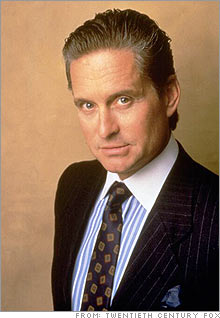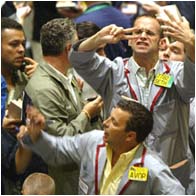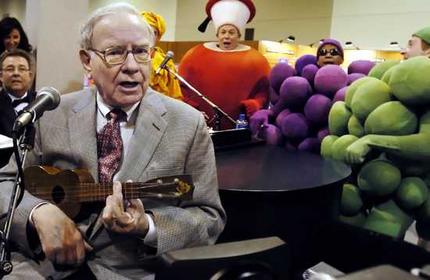-
“Who Put This Dick on My Back?”
Posted by Eddy Elfenbein on October 17th, 2008 at 2:29 pm -
Sentences I Never Thought I’d Write
Posted by Eddy Elfenbein on October 17th, 2008 at 1:20 pmGood news, the VIX is down to 67!
-
A Former Lehmaner Tries to Make Do
Posted by Eddy Elfenbein on October 17th, 2008 at 12:56 pm
(Hat Tip: B-Riz) -
Debt: The Good and the Bad
Posted by Eddy Elfenbein on October 17th, 2008 at 12:33 pmFelix comes to the defense of Suze Orman. I think he makes a good case for her. Orman’s advice probably helps more people in more important ways that almost anyone you see on CNBC.
The only curious thing I would add is that when you get right down to it, how hard is it to say, “don’t buy things you can’t afford?” It’s not really about finances, it’s just basic discipline. Don’t buy stupid stuff you don’t need, and save what you can. Repeat. I guess I shouldn’t be too harsh. For many people, this lesson may come as a revelation.
Warren Buffett has often said that the biggest problem that consumers have is credit card debt. I think he’s right. I’m afraid to find out how many people have bought pizzas that turned out to cost them $200.
Speaking about debt. Virginia Postrel has a great column in Forbes decrying the endless hand-wringing of debt-phobes. Yes, debt can be a good thing.When credit is cheaper to use and easier to arrange, people do use more of it. Hence those big, scary numbers, which grow along with the economy and the population. Contrary to a common perception, however, the people driving up the totals aren’t primarily the financially strapped. They’re “high-wealth consumers in their prime earning years,” observes Andrew Kish, an economist at the Philadelphia Federal Reserve. Almost half the growth in debt between 1989 and 2004 (the most recent year for which data are available) came from the highest-income 20 percent of American households. (By contrast, the bottom 20 percent held about 3 percent of consumer debt—an increase from 1.9 percent—and accounted for a bare 4.5 percent of the growth.) If the rich are getting richer, it makes sense that they’re also running up more debt. They can reasonably expect to pay it.
These affluent families also account for half of the outstanding consumer debt. So the $10,000 average that Obama cited isn’t in fact owed by the “typical” family with an average income. That figure is calculated by spreading the much larger debts of the rich over the population as a whole. All by herself, Cindy McCain owed at least $200,000 on two American Express cards, according to her husband’s campaign disclosure documents. That sounds terrifying until you realize that this wealthy woman pays her monthly AmEx bills in full. -
Remember What I said About Greed Being Good. Um…Maybe Not.
Posted by Eddy Elfenbein on October 17th, 2008 at 10:35 am
A sequel to Wall Street is moving ahead. According to the Telegraph, the film will be very timely:The story, which will be set during the current credit crisis, will see Gordon Gekko released from prison into a Wall Street which is in meltdown.
Ideally, Gekko would have his own show on CNBC.
(Via: WSF). -
Finally
Posted by Eddy Elfenbein on October 17th, 2008 at 10:29 amAlea notes that the TED Spread finally falls below 400.
-
Those Crazy Hand Signals Traders Use
Posted by Eddy Elfenbein on October 17th, 2008 at 10:16 am
Ever wonder what those crazy hand signals are that traders use? Here’s a primer from Britain:With the introduction of electronic trading, hand signals have disappeared from the London Stock Exchange. But traders on some exchange floors around the world still like to wave their hands and fingers about to strike a deal.
Hands out in front but pulling towards you: I’m buying
Hands out in front, palms out, pushing away: I’m selling
Combination of finger signals indicates the buying/selling price (a closed fist indicates a zero). Then,
Touch the face: signals the amount to buy/sell
Finger to chin: multiples of 1
Finger to forehead: multiples of 10
Fist to forehead: multiples of 100I’m afraid I’d accidentally buying 10 billion shares of something.
-
Buy American. I Am.
Posted by Eddy Elfenbein on October 17th, 2008 at 10:13 am
The Oracle makes the case for stocks:Over the long term, the stock market news will be good. In the 20th century, the United States endured two world wars and other traumatic and expensive military conflicts; the Depression; a dozen or so recessions and financial panics; oil shocks; a flu epidemic; and the resignation of a disgraced president. Yet the Dow rose from 66 to 11,497.
You might think it would have been impossible for an investor to lose money during a century marked by such an extraordinary gain. But some investors did. The hapless ones bought stocks only when they felt comfort in doing so and then proceeded to sell when the headlines made them queasy.
Today people who hold cash equivalents feel comfortable. They shouldn’t. They have opted for a terrible long-term asset, one that pays virtually nothing and is certain to depreciate in value. Indeed, the policies that government will follow in its efforts to alleviate the current crisis will probably prove inflationary and therefore accelerate declines in the real value of cash accounts.
Equities will almost certainly outperform cash over the next decade, probably by a substantial degree. Those investors who cling now to cash are betting they can efficiently time their move away from it later. In waiting for the comfort of good news, they are ignoring Wayne Gretzky’s advice: “I skate to where the puck is going to be, not to where it has been.” -
-733.08
Posted by Eddy Elfenbein on October 15th, 2008 at 9:06 pmThe Dow dropped today by 733.08 points to close at 8577.91. That’s a loss of 7.87%. By percentage, this was worse than both October 9 (-7.33%) and September 29 (-6.98%). This was the worst day for the Dow since October 26, 1987, and it was the ninth-worst day ever. Three of the 19 worst days have come in the last 13 sessions.
The S&P 500 fell by 9.03% today which was much worse than the Dow. The Dow has outperformed the S&P 500 on all three big plunges. It also performed on October 7, which was only a drop of 5.11%.
The Dow has been steadily outperforming the S&P for nearly three years. In fact, last week the Dow-to-S&P ratio hit a 5-1/2 year high. The ratio hasn’t broken 9.5 yet, but it seems as if it’s about to. The ratio hasn’t been over 10 since 1966. -
Unitedhealth Group Moves Up Earnings Data
Posted by Eddy Elfenbein on October 15th, 2008 at 4:34 pmUnitedhealth Group (UNH) just said that it will report earnings tomorrow, instead of next week as originally planned. Something could be up, but I’ve lost a lot of faith in this company. Previously, the company said it expects 2008 EPS of $2.95 to $3.05. Since that translates to a P/E ratio of about 7, I don’t the market trusts them either.
-
-
Archives
- April 2025
- March 2025
- February 2025
- January 2025
- December 2024
- November 2024
- October 2024
- September 2024
- August 2024
- July 2024
- June 2024
- May 2024
- April 2024
- March 2024
- February 2024
- January 2024
- December 2023
- November 2023
- October 2023
- September 2023
- August 2023
- July 2023
- June 2023
- May 2023
- April 2023
- March 2023
- February 2023
- January 2023
- December 2022
- November 2022
- October 2022
- September 2022
- August 2022
- July 2022
- June 2022
- May 2022
- April 2022
- March 2022
- February 2022
- January 2022
- December 2021
- November 2021
- October 2021
- September 2021
- August 2021
- July 2021
- June 2021
- May 2021
- April 2021
- March 2021
- February 2021
- January 2021
- December 2020
- November 2020
- October 2020
- September 2020
- August 2020
- July 2020
- June 2020
- May 2020
- April 2020
- March 2020
- February 2020
- January 2020
- December 2019
- November 2019
- October 2019
- September 2019
- August 2019
- July 2019
- June 2019
- May 2019
- April 2019
- March 2019
- February 2019
- January 2019
- December 2018
- November 2018
- October 2018
- September 2018
- August 2018
- July 2018
- June 2018
- May 2018
- April 2018
- March 2018
- February 2018
- January 2018
- December 2017
- November 2017
- October 2017
- September 2017
- August 2017
- July 2017
- June 2017
- May 2017
- April 2017
- March 2017
- February 2017
- January 2017
- December 2016
- November 2016
- October 2016
- September 2016
- August 2016
- July 2016
- June 2016
- May 2016
- April 2016
- March 2016
- February 2016
- January 2016
- December 2015
- November 2015
- October 2015
- September 2015
- August 2015
- July 2015
- June 2015
- May 2015
- April 2015
- March 2015
- February 2015
- January 2015
- December 2014
- November 2014
- October 2014
- September 2014
- August 2014
- July 2014
- June 2014
- May 2014
- April 2014
- March 2014
- February 2014
- January 2014
- December 2013
- November 2013
- October 2013
- September 2013
- August 2013
- July 2013
- June 2013
- May 2013
- April 2013
- March 2013
- February 2013
- January 2013
- December 2012
- November 2012
- October 2012
- September 2012
- August 2012
- July 2012
- June 2012
- May 2012
- April 2012
- March 2012
- February 2012
- January 2012
- December 2011
- November 2011
- October 2011
- September 2011
- August 2011
- July 2011
- June 2011
- May 2011
- April 2011
- March 2011
- February 2011
- January 2011
- December 2010
- November 2010
- October 2010
- September 2010
- August 2010
- July 2010
- June 2010
- May 2010
- April 2010
- March 2010
- February 2010
- January 2010
- December 2009
- November 2009
- October 2009
- September 2009
- August 2009
- July 2009
- June 2009
- May 2009
- April 2009
- March 2009
- February 2009
- January 2009
- December 2008
- November 2008
- October 2008
- September 2008
- August 2008
- July 2008
- June 2008
- May 2008
- April 2008
- March 2008
- February 2008
- January 2008
- December 2007
- November 2007
- October 2007
- September 2007
- August 2007
- July 2007
- June 2007
- May 2007
- April 2007
- March 2007
- February 2007
- January 2007
- December 2006
- November 2006
- October 2006
- September 2006
- August 2006
- July 2006
- June 2006
- May 2006
- April 2006
- March 2006
- February 2006
- January 2006
- December 2005
- November 2005
- October 2005
- September 2005
- August 2005
- July 2005
 Eddy Elfenbein is a Washington, DC-based speaker, portfolio manager and editor of the blog Crossing Wall Street. His
Eddy Elfenbein is a Washington, DC-based speaker, portfolio manager and editor of the blog Crossing Wall Street. His